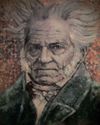試す 金 - 無料
Kant on Time
Philosophy Now
|August/September 2023
Letizia Nonnis unfolds Kant’'s conception of the nature of and experience of time.

One of the most influential accounts of time in the West is the one produced by Immanuel Kant (17241804). It is my intention here to explore Kant's concept of time, especially the way it is bound up with language. This does not mean that I will reduce the problem of time to a mere matter of language, but I do want to demonstrate that language plays a crucial role in respect to time. To do this I will look at Kant's 1781 blockbuster The Critique of Pure Reason and in particular at the section entitled 'The Transcendental Aesthetic'. Although Kant doesn't spend many words on time, reducing the argument to a footnote at the end of the chapter, the argument is very close to the one he employs with regard to space. But even if one argues that time and space are asymmetrical with respect to the senses - time is part of the 'inner sense', and space is an aspect of the 'outer sense' - time alone is not sufficient to render our experience ordered and comprehensible.
I will argue that the concepts of past, present, and future are not essential to the nature of time as Kant sees it. The idea is that the distinction between future and past - integral to our sense of the flow of time - is inextricably conceptual, and as such does not belong to the sensory elements of our experience, but is thereby inextricably bound to language.
All this needs a little explanation.
The Language of Experience
In
このストーリーは、Philosophy Now の August/September 2023 版からのものです。
Magzter GOLD を購読すると、厳選された何千ものプレミアム記事や、9,500 以上の雑誌や新聞にアクセスできます。
すでに購読者ですか? サインイン
Philosophy Now からのその他のストーリー

Philosophy Now
Pharmaco-Metaphysics?
Raymond Tallis argues against acidic assertions, and doubts DMT discoveries.
7 mins
August/September 2025

Philosophy Now
Nine Spiritual Exercises
Massimo Pigliucci explains how to get Philo-Sophical.
3 mins
August/September 2025

Philosophy Now
Books
We follow mammal's search for meaning, as Mark Vorobej savages John Gray's book of impractical cat philosophy, while B.V.E. Hyde ponders the point of Jordan Peterson. In Classics, Hilarius Bogbinder reviews Plato's Republic.
21 mins
August/September 2025

Philosophy Now
The Centennial of the Scopes ‘Monkey’ Trial
Tim Madigan on the creation and the evolution of a legend.
14 mins
August/September 2025

Philosophy Now
Gödel, Wittgenstein, & the Limits of Knowledge
Michael D. McGranahan takes us to the edge of language, mathematics and science.
10 mins
August/September 2025

Philosophy Now
Weltschmerz and the World
Ian James Kidd takes a realistic and global view of the history of pessimism.
10 mins
August/September 2025
Philosophy Now
What Makes A Work Of Art Great?
Each answer below receives a book. Apologies to all the entrants not included.
16 mins
August/September 2025

Philosophy Now
The Beatles: Nothing is Real
Clinton Van Inman gets back to the psychedelic Sixties.
4 mins
August/September 2025

Philosophy Now
The Post-Truth Kerfuffle
Susan Haack, who is Distinguished Professor in the Humanities, Cooper Senior Scholar in Arts & Sciences, Professor of Philosophy, and Professor of Law, at the University of Miami, talks with Angela Tan about how and when we know.
11 mins
August/September 2025

Philosophy Now
A Crisis of Attention
Paul Doolan attends to our culture of attention demanding.
13 mins
August/September 2025
Translate
Change font size
